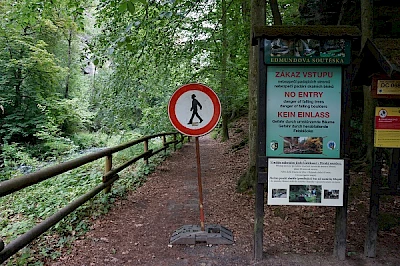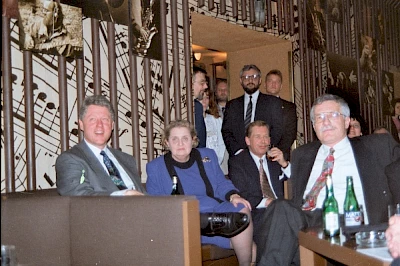Weekly review no. 24
15.03.2024
National Park closes Edmundsklamm for another three years

The popular Edmund Gorge (Edmundova soutěska) in Bohemian Switzerland will remain closed for significantly longer than previously known. The Bohemian Switzerland National Park announced that it will not carry out any tree felling work in and above the Edmundsklamm until 2027. The same applies to the Gabrielensteig (Gabrielina stezka) from Mezní Louka (Rainwiese) to Prebischtor (Pravčická brána). This means that the popular paths remain closed for safety reasons.
According to the national park administration, the area around the two paths should be left to its own devices for three years. “It has been shown that we can reopen the paths as quickly as possible if we give nature some time to regenerate,” explains national park director Pavel Kříž. As part of studies, a test felling was carried out above the Edmundsklamm. The intervention showed that felling on a large scale would destroy the nature around the paths and at the same time safety would not be guaranteed. “The felling would disturb the thin layer of soil,” says director Kříž. Stones and boulders could come loose. In addition, the felling itself is not without danger and involves high costs.
According to Kříž, simply leaving the burned stumps has other advantages. They store moisture and ensure sustainable drainage of rainwater into soil layers. At the same time, the tree stumps are food for insects, which in turn keep birds in the area as food. Some species of birds and bats also use the dead trees as nesting places. In addition, the burned trees scattered thousands of seeds that sprouted last year. Logging would also destroy this natural reforestation. A video commissioned by the national park shows what it looks like on the Gabrielensteig and above the Edmundsklamm and what consequences an impact would have.
The lockdown until 2027 is a hard blow. In an initial statement, the municipality of Hřensko, which owns the Edmundsklamm and runs the barge trips, was particularly disappointed. “The problem is that we largely take over the tasks of the state. We finance a fire department that not only takes care of fire protection on the front line, but also the mountain rescue service. We spend a lot of money on local police, who in many ways replace the absent state police. That costs a lot of money and we are sorely missing the income from the Edmundsklamm,” said deputy mayor Robert Mareš in an initial reaction to the daily newspaper Mladá fronta Dnes.
Děčín Zoo is car-free for three months
Anyone who wants to visit the zoo in Děčín in the coming months will have to be prepared for a short walk. Due to construction work, the only access road to the zoo, Žižkova Street, has been closed since Monday. The road should be open again from June 9th, before the start of the main season. But until then, visitors with fitness are required, as the zoo is located above the Shepherd's Wall (Pastýřská stěna). The road is only closed between 8 a.m. and 5 p.m. during the week. But times can still change and outside of construction work times, passage is only possible for cars.
Either way, the Děčín magistrate recommends leaving the car in the parking lot on Práce Street between the railway tracks and the Elbe and using the footpath over the Jahn Lookout (named after gymnastics father Friedrich Ludwig Jahn) and further uphill to the zoo. At 670 meters, this would also be the shortest route to the zoo. This option is also easily accessible from the main train station. As a second option, the red-marked hiking trail from the Tyrš Bridge over the Puchmayerova Street up to the Schäferwand is recommended. The car could then be parked at the parking lot below the Tyrš Bridge. This route is a little longer at just under a kilometer.
The closure comes at an inopportune time for the zoo, as it is celebrating its 75th anniversary this year. In an initial reaction, he quickly moved one of his anniversary events from May to August. Now the zoo is calling on its fans on August 31st to come to the zoo with a bear Nicki. The Siberian brown bear Bruno is the zoo's mascot and by far the most popular animal. The zoo wants to set a new record with as many Nicki bearers as possible.
The Czech Republic celebrates 25 years of NATO membership

Three JAS-39 Gripen fighters, two Eurofighter Typhoon fighters and an A-400MS Atlas transport from Germany flew just 200 meters over the Czech capital on March 12. With this symbolic formation, the Czech Republic celebrated 25 years of membership in NATO. In March 1999, Poland and Hungary became the first former Eastern Bloc states to join the transatlantic defense alliance.
The then US President Bill Clinton took part in the celebrations in Prague as a guest of honor. His visit brought back memories, especially since the Czech President and former highest-ranking NATO general Petr Pavel gave his guest a visit to the legendary Reduta jazz club. Former President Václav Havel took him there in 1994. Clinton was not only enthusiastic, but was also persuaded to do a saxophone solo.
He left the music-making to others that evening, but he recalled that it was he who appointed the Czech-born Madeleine Albright first as UN ambassador and later as foreign minister. Albright, Havel's good friend, vehemently supported his efforts to get the Czech Republic into NATO as quickly as possible. Havel put all his foreign policy weight behind this, and it is indicative of the priorities in the neighboring country that the Czech Republic first joined NATO and then the European Union.
It was also significant that this week of all days the Czech Republic was able to report that it had collected enough money to purchase 800,000 rounds of artillery ammunition from third countries in order to quickly solve the ammunition shortage in Ukraine. Britain's The Telegraph could not praise this initiative highly enough. "If it's true that artillery is the king of war, then this small Eastern European country is the kingmaker..." Apart from the fact that Czechs see themselves more as Central Europeans, many people in the Czech Republic will be able to agree with this sentence.
Trouble between Prague and Bratislava
Where otherwise no leaf can fit between them, there is currently a cool distance: the two neighboring countries Czech Republic and Slovakia, which separated from Czechoslovakia into two independent states in an exemplary manner over 30 years ago, are currently divided over how to deal with Russian aggression in Ukraine. At the beginning of March, the Czech government decided to suspend regular government consultations.
It was only in the fall, after the left-wing populist Robert Fico took over as head of government in Bratislava, that both sides agreed to continue consultations. The summit of the Visegrád states, i.e. between Hungary, Poland, Slovakia and the Czech Republic, also ended on a conciliatory note in Prague at the end of February. The views on Russia and Ukraine couldn't be more different. On one side are the Pole Donald Tusk and the Czech Petr Fiala, both clear allies of Ukraine and staunch transatlanticists. On the other hand, Viktor Orbán is the eternal troublemaker in the EU, who doesn't want to give up his admiration for Putin. Robert Fico may have other motives, but in his pro-Russian stance he has nothing to do with Orbán.
But this meant that a red line had now been crossed for Prague. The Czechs have just successfully forged a coalition to supply ammunition to Ukraine. Fico's refusal to provide military support to Ukraine is an affront. How long the new ice age will last and whether and when consultations will resume is not yet known.
If you would like to receive our weekly review regularly in your email inbox, sign up for our newsletter.
To subscribe to the newsletter
 The creation of this newsletter is co-financed by tax revenue based on the budget approved by the Saxon state parliament.
The creation of this newsletter is co-financed by tax revenue based on the budget approved by the Saxon state parliament.
